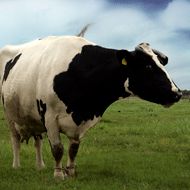Over 70 people killed by cattle in 15 years - HSE

Seventy per cent of farm deaths involved either a bull or a newly calved cow.
Accidents involving cattle have claimed the lives of 74 people in the past 15 years, according to new figures released by the Health and Safety Executive (HSE).
Farmers and farm workers are now being urged to take steps to mitigate the risks.
Eighteen of the accidents involved members of the public and took place on public footpaths or other commonly used rights of way. Cows with calves were involved in 10 of the incidents, according to the recorded information.
HSE says farmers should avoid keeping cows and calves in fields with public footpaths. If this is not possible, appropriate signage should be provided and optional protected walkways should be considered.
All but one of these accidents involved dog walkers and nearly all were lone walkers, or were accompanied by one other person. The sole exception was a member of the public who had walked away from a family group.
Age also appears to be an issue, the health and safety regulator reports. Only one of the 18 was under the age of 50.
Out of the 56 workers who were involved in fatal accidents, 87.5 per cent were over the age of 50. As a result, the HSE is recommending that age be taken into consideration when carrying out risk assessments. It advises that members of the agriculture community 'assess honestly' their ability to handle cattle.
Of the 56 deaths, 44 were farmers, while the remainder were workers or helpers.
Interestingly, the breed of cattle does not appear to be a factor - both dairy and beef cattle were involved in the accidents.
However, 70 per cent of farm deaths involved either a bull or a newly calved cow, therefore the HSE is urging workers to carefully plan any activities involving these animals.
For the full report visit: http://www.hse.gov.uk/aboutus/meetings/iacs/aiac/090615/aiac-paper-150601.pdf



 The latest
The latest